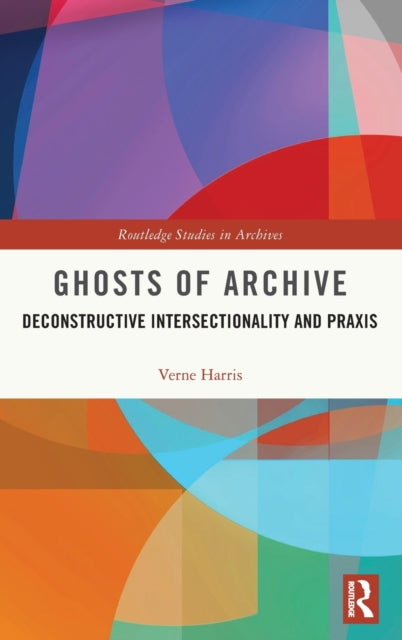Verne Harris
Ghosts of Archive: Deconstructive Intersectionality and Praxis
Ghosts of Archive: Deconstructive Intersectionality and Praxis
YOU SAVE £6.96
- Condition: Brand new
- UK Delivery times: Usually arrives within 2 - 3 working days
- UK Shipping: Fee starts at £2.39. Subject to product weight & dimension
Bulk ordering. Want 15 or more copies? Get a personalised quote and bigger discounts. Learn more about bulk orders.
Couldn't load pickup availability
- More about Ghosts of Archive: Deconstructive Intersectionality and Praxis
Ghosts of Archive argues that archive is fundamentally and structurally spectral and that the work of archive is justice. It establishes a unique nexus between deconstructive intersectionality and traditions of 'memory for justice' in struggles against oppression, and offers new ideas about spectrality, banditry, and archival activism.
Format: Hardback
Length: 166 pages
Publication date: 22 December 2020
Publisher: Taylor & Francis Ltd
Ghosts of Archive is a groundbreaking book that delves into the enigmatic realm of archives, challenging the conventional understanding of these repositories of historical and cultural information. Through a rich tapestry of deconstruction, intersectionality, and archetypal psychology, the author argues that archives are not merely physical containers but are, in fact, fundamentally and structurally spectral. This spectral nature implies that archives are imbued with the lingering presence of past events, memories, and individuals, shaping their contents and meanings in profound ways.
The author's extensive research on deconstruction and archives over the past two decades serves as the foundation for this compelling argument. The book posits that archives are not just mere archives but are essential resources for social justice activism. It serves as a source of inspiration, wisdom, and resilience for individuals and communities seeking to confront injustice and promote equity. By exploring the concept of "hauntology," which refers to the study of the haunting presence of the past, the author invites readers to engage with the call for justice in non-disciplinary spaces.
The book establishes a unique nexus between deconstructive intersectionality and traditions of "memory for justice" in struggles against oppression from South Africa and elsewhere. It argues that archives are not just passive repositories of information but are actively constructed in relation to the social, political, and cultural contexts in which they arise. Moreover, the book recognizes that archives are beset by ghosts—the ghosts of the living, the dead, and those yet to be born—and that attention should be paid to these spectral entities.
By delving into the complexities of spectrality, banditry, and archival activism, Ghosts of Archive offers fresh insights into the workings of archives. It challenges the notion of archives as neutral and objective repositories of knowledge and instead emphasizes their role in shaping and perpetuating power structures. The book proposes a deconstructive praxis in the contemporary archive, one that encourages readers to critically examine the ways in which archives are constructed, used, and preserved.
This book is a must-read for those working in the disciplines of archival science, information studies, and psychology. It provides valuable insights into the spectral nature of archives, their role in social justice activism, and the potential for transformative archival practices. Moreover, it appeals to a wide range of readers, including those with an interest in social justice issues, transitional justice, history, philosophy, memory studies, and postcolonial studies.
In conclusion, Ghosts of Archive is a groundbreaking work that offers a fresh perspective on the enigmatic realm of archives. Through a multidisciplinary approach, the author challenges the conventional understanding of archives and proposes that they are not just physical containers but are, in fact, fundamentally and structurally spectral. This spectral nature implies that archives are imbued with the lingering presence of past events, memories, and individuals, shaping their contents and meanings in profound ways. By exploring the complexities of spectrality, banditry, and archival activism, the book provides valuable insights into the role of archives in social justice activism and the potential for transformative archival practices. This book is a must-read for those working in the disciplines of archival science, information studies, and psychology, as well as for those with an interest in social justice issues, transitional justice, history, philosophy, memory studies, and postcolonial studies.
Weight: 390g
Dimension: 160 x 242 x 18 (mm)
ISBN-13: 9780367361075
This item can be found in:
UK and International shipping information
UK and International shipping information
UK Delivery and returns information:
- Delivery within 2 - 3 days when ordering in the UK.
- Shipping fee for UK customers from £2.39. Fully tracked shipping service available.
- Returns policy: Return within 30 days of receipt for full refund.
International deliveries:
Shulph Ink now ships to Australia, Belgium, Canada, France, Germany, Ireland, Italy, India, Luxembourg Saudi Arabia, Singapore, Spain, Netherlands, New Zealand, United Arab Emirates, United States of America.
- Delivery times: within 5 - 10 days for international orders.
- Shipping fee: charges vary for overseas orders. Only tracked services are available for most international orders. Some countries have untracked shipping options.
- Customs charges: If ordering to addresses outside the United Kingdom, you may or may not incur additional customs and duties fees during local delivery.


